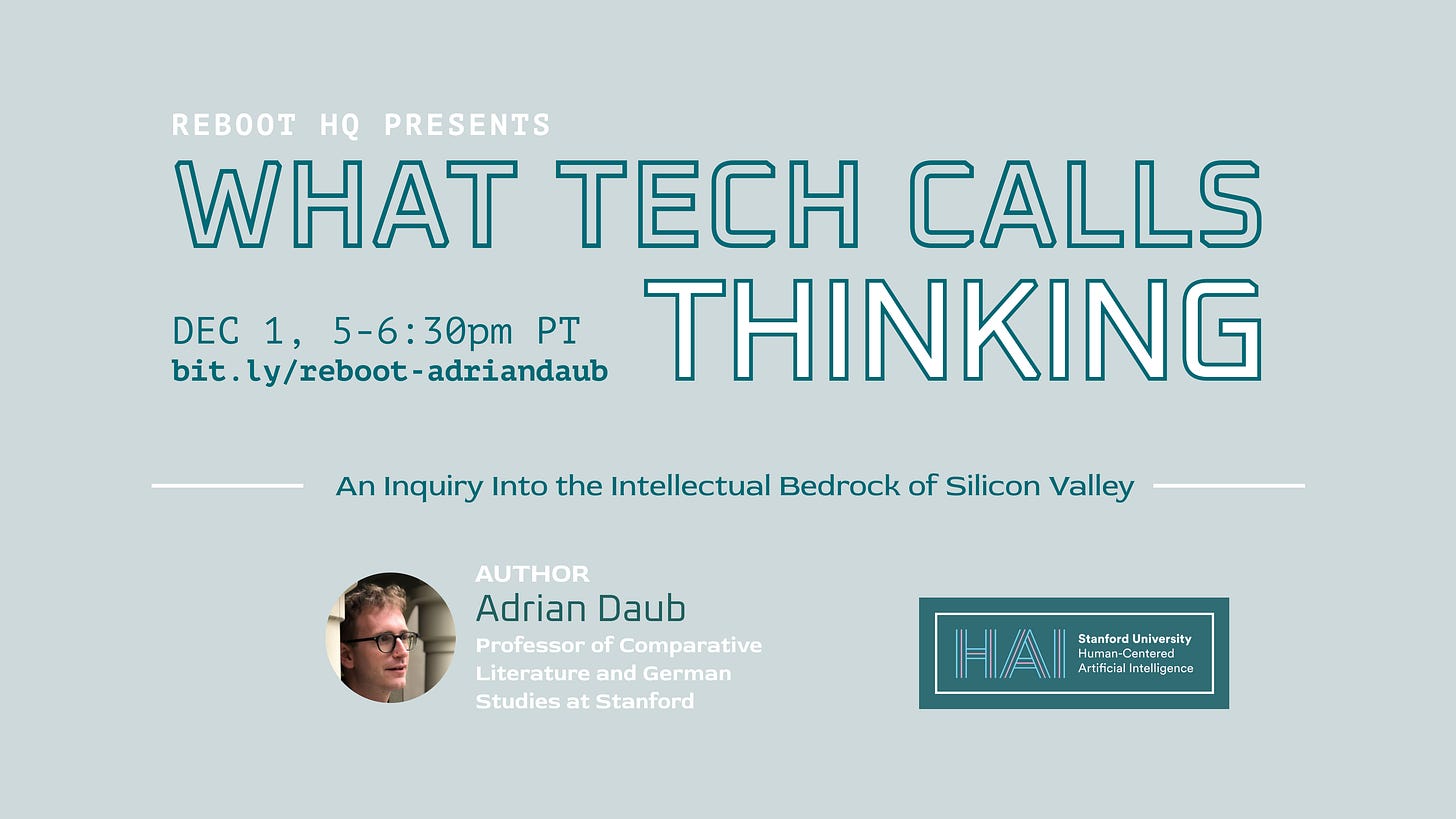⚡ New Event: The Intellectual Bedrock of Silicon Valley
Stanford professor Adrian Daub chats about his book What Tech Calls Thinking
I'm not the kind of person who keeps a book on my nightstand and reads a chapter every night. I read books in bursts—knock two out on a long plane ride, one in an afternoon in the park, six around Christmas and New Year's, sitting on my parents' couch. This long weekend, I'm hoping to get through The Dragon Republic, a fantasy by R.F. Kuang, and This Could Be Our Future, a political manifesto by Kickstarter founder Yancey Strickler.
If you need some Thanksgiving reading inspiration, check out our Twitter thread and giveaway. We've handed out 20+ personalized recommendations and counting. If you want one too, just reply to the tweet (or this email).

📖 what tech calls thinking by adrian daub
Our guest for next Tuesday, December 1 is Stanford professor Adrian Daub, author of What Tech Calls Thinking: An Inquiry Into The Intellectual Bedrock of Silicon Valley.
"This is a book about the history of ideas in a place that likes to pretend its ideas don't have any history," Daub begins. He proceeds to wittily deconstruct the philosophies and ideologies undergirding the Silicon Valley mythos. At our chat, we'll discuss everything from Marshall McLuhan's technological determinism to Nick Land's ruthless accelerationism—and what it all tells us about understanding the tech world today.
The event is from 5-6:30pm Pacific: one hour of moderated Q&A, and an optional open discussion. You can register on Eventbrite below:
🔊 our take: tech gets a culture critique
By Deblina Mukherjee
There aren't any footnotes in Adrian Daub's What Tech Calls Thinking. There aren't even any links. The book's references—mentioned on the very last page, and hosted on Daub's website—read more like a browser history than traditional references. A TED talk here, a blog post there: these are a handful of Silicon Valley's most public artifacts and assemblages.
These artifacts are what Daub deconstructs over the course of the book. Each chapter revolves around a particular trope or theme of Silicon Valley—"Dropping Out," "Genius," "Disruption," and the like—which are analyzed using the work of a particular thinker—Ayn Rand, René Girard, Joseph Schumpeter, to name a few. In one instance, Daub connects Marshall McLuhan's infamous saying "the medium is the message" to the tech industry's penchant for privileging platforms over people. This, he suggests, is why engineers, not creators, get the credit for cultural shifts in communication. (The book's idea-per-page density makes it competitive with Twitter, which means it's absolutely off-the-charts compared to most other books I've read recently.)
I don't mention all this—the cherry-picking of thinkers and phrases, the contemplation of culture, the lack of footnotes—to discredit the book. Far from it. The revolution will not be peer-reviewed, after all. These are all just signs of a different kind of argumentation, one that doesn't necessarily rely on the trappings of fact and empiricism we might be used to, especially if your background is in the social sciences or something STEM-ier. Still, the success of these arguments depends almost entirely on how aligned the reader is to the author—only under this condition can Daub's jumps connect naturally and readily. If mis-done, arguments like these can seem less like an elegant weaving of threads and more like a conspiracy theorist's yarn-filled cork board.
Fortunately, What Tech Calls Thinking gets it right. Daub reads as lucid, and it's okay that he trusts his own eyes—because, for one, of who he is (a Stanford professor, among other things). For another, he seems to be one of the rare writers who not only respects his readers, but genuinely likes them. And finally, and maybe most importantly, unlike a conspiracy theorist, Daub doesn't seem to have an agenda. His ending anecdote, Herodotus's telling of the good-fortuned King Polycrates and his ring, makes it clear that Daub just wants his readers to think. He's quite literally the English teacher we'd all love to have, trying to show us what we miss when we filter the world through numbers.
🌀 microdoses
☠️ Sci-fi author Cory Doctorow makes the case against literary dystopias
💕 The NYT used GPT-3 to write Modern Love columns
🍲 Countries are not culinary monoliths: why we need a regional understanding of food.
🤔 This is the beauty of What Tech Calls Thinking

🎥 The revolution will be... venture-backed?

💝 a closing note
Whether you'll be with friends, family, or by yourself, Thanksgiving is an excellent excuse to make your favorite comfort foods. Here are ours:
Jasmine: My favorite winter food is my mom's wontons—no restaurant compares. She doesn't use a recipe, but the pescatarian version includes chives, scrambled egg, oyster sauce, and shrimp.
Em: Die hard soup fan over here, and my comfort food is chips. The crunchy sound mixed with the texture provides a lot of understated psychological relief. For Thanksgiving, though, I recommend this creamed corn recipe with high-quality cheddar.
Ben: I’ve been waiting to make this cornbread stuffing since I saw it on Bon Appétit last year and am super excited to finally try it.
Deb: I have tried so, so many chocolate chip cookie recipes. My current conclusion is that the absolute best one is the Tasty recipe.
Have a safe, relaxing holiday!
—Jasmine & Reboot team




